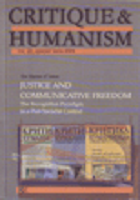ARTIKULATION VON WERTSETZUNGEN ALS GEGENSTAND VON GERECHTIGKEITSTHEORIE
THE ARTICULATION OF VALUES AS A SUBJECT OF THE JUSTICE CONCEPT
Author(s): Krassimir StojanovSubject(s): Philosophy
Published by: Фондация за хуманитарни и социални изследвания - София
Keywords: concept of justice; Axel Honneth; socialization; communicative concept of justice; justice; recognition
Summary/Abstract: Krasimir Stojanov is searching for a key that could enrich the content of the third form of recognition (the social esteem) in order to avoid its reduction to the acknowledgment of personal capabilities of individuals by fair rewards for their work achievements. Stojanov argues that social esteem concerns also the articulation of individual’s value commitments as they are initially shaped in particular cultural and social contexts. A concrete example of a sphere where the fair work reward is insufficient to pay recognition to the agent’s individual capabilities is the institutional fi eld of public education. A series of recent empirical studies in Germany shows that pupils of immigrant background are being treated (and therefore evaluated) by their teachers as a by-product of a deviating and defi cit family socialization and hence, are deprived of an opportunity to articulate their own value commitments by interculturally translating them. Stojanov insists that such forms of disregard could be overcome through a theoretical and practical revision of the concept of social esteem along the lines of Robert Brandom’s theory of the social constitution of expressive reason. Irrespectively of their specifi c cultural background, value commitments deserve social esteem whenever they could be presented as sequential from preceding value statements and as premises for subsequent value inferences. In that way we could also avoid the risk of reducing the sphere of social esteem to a certain mono-culturally fi xed “division of labour”; in other words, the conception of communicative justice expands its scope and simultaneously, confronts better the practical challenges that “multicultural societies” are facing today.
Journal: Критика и хуманизъм
- Issue Year: 2006
- Issue No: 22
- Page Range: 117-129
- Page Count: 13
- Language: German
- Content File-PDF

